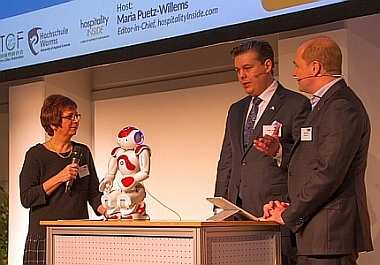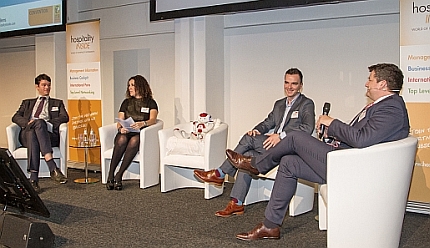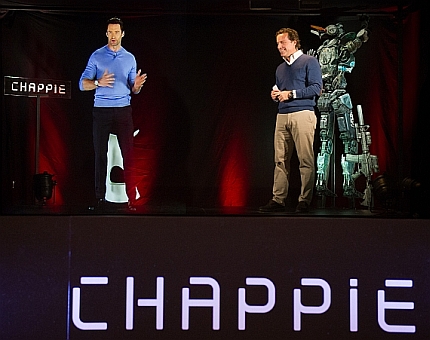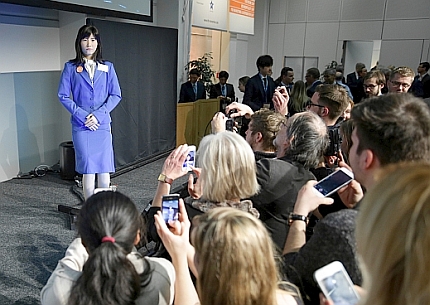ITB Hospitality Day: Humanoids still a joke but they will become job killers (short version)
 |
|
| Roger Langhout, GM of the Ghent Marriott (middle) and Fabrice Goffin of the software company ZoraRobot introduce Mario. Moderator Maria Puetz-Willems welcomed Mario as her "co-host" on demand. / photos (3): hospitalityInside |
Berlin (March 18, 2016). Seldom has a participant in a discussion at "ITB Hospitality Day" during ITB Berlin received such attention as was the case with Mario. Visitors would love to have hugged the 57 cm "tall" robot with mischievous eyes; at least, they all wanted to take a picture of him. The Japanese female robot ChihiraKanae seemed a bit more wilful although she had humanoid features and attracted a great deal of interest at the ITB Marketing and Distribution Day. There were many topics for discussion concerning robots and their impact on the work environment – with the sober recognition that the programmed beings are able to find their way into the hotel industry faster than anticipated. Fred Fettner provides a summary.
This appearance among experts is already proof for the reason why the Belgian Ghent Marriott Hotel has Mario working at its front desk. "We want to know what is important to guests but we do not know if we will intensify our experiments in this direction as a hotel chain," said General Manager Roger Langhout in Berlin. Mario works at the reception desk, he passes on the key cards. "In addition, we often use him at conferences. He has strong charisma, reads the text of slides, works during the breaks and even has a games programme, he is able to sing and dance," said Langhout. Upon request, Mario quickly transformed into a dancing animator... A humanoid robot just has an enormous sentimental value – this was clearly visible by the numerous smartphones held in the air and all the pictures taken in the conference hall at ITB.
However: Mario himself is still held on a very short leach. This is not about artificial intelligence as every activity was controlled by Mario's software "father" Fabrice Goffin via tablet. The answers to the questions of the interview had to be programmed in advance. At the Belgian software producer ZoraRobot, 34 people are employed thanks to Mario; globally, there are already 200 robots in action – originally created for retirement and care homes for the elderly. "However, in the meantime, they are already present in numerous hotels, amongst others in Utrecht, Amsterdam and France," said Goffin, seeing this as only the beginning. Because of its small size the robot is more of a buddy. In most parts of the world, people want to be at least physically superior to robots, which are able to move their limbs and have an expressionless face.
Survey: Robots will come despite apprehension
In a global survey by Travelzoo International – exclusively for the ITB – regional differences were confirmed in parts. The French and British are afraid of robots. Exactly half of the people surveyed agreed with the statement "I find the idea of robots quite scary." In the middle of the field are, for example, Germany, USA, Japan and Brazil, while the Chinese were probably surprised by the question: only 2 percent agreed fully and 12 percent with reservations.
 |
|
| Robots will take over services in the hospitality industry in future. Roland Schwecke, DICON Berlin, moderator Sarah Douag, Mario, Richard Singer of Travelzoo and Stephan Demmerle of NH Hotels (from left) discussed the impact of machines and hightech. |
This picture becomes largely visible in the entire survey, where the strengthened future role of robots in our everyday life is seen as pretty uniform around the globe. However, surveyed for shorter time spans, distinctive differences are visible again: The question "I believe robots will be a big part of life in just a few years," separates China from the rest of the world. But it is astonishing that only one quarter of the surveyed is sceptical concerning this statement from a global point of view.
According to the European Commission, the market of humanoid robots will be worth 100 billion euros in five years. As Travelzoo's President Richard Singer summarised in the subsequent discussion, 80 percent believe that humanoid robots could already play an important role in 2020. Three quarters believe in a positive influence. Currently, this seems understandable. Mario and his colleagues have not destroyed any jobs so far. The surveys also showed that only a very small minority of guests would like to be contacted by a robot only. A human being should always be present.
Half of all hotel jobs replaceable?
In the long term, however, the picture is different, as Roland Schwecke, Managing Director at Marketing Consultancy DICON from Berlin, said. He quoted figures from the highly recognised study "The Future of Employment" by Frey and Osborne, which examined 700 classical job areas in the US with regard to the influence of digitalisation. Central result: the lower the qualification and payment of the employee the higher the probability that the job is dispensable.
 |
|
| The Australian actor Hugh Jackman (left) as a virtual guest during Sony Pictures' presentation of the new movie Chappie in Madrid. / photo: NH Hotels |
This way, up to half of all current hotel jobs could be replaced by software solutions, robots and smart machines by 2025. According to this, management positions have the best prospects; the worst perspectives have all jobs connected with administration and with receipt of payment especially: book keepers, clerks and cashiers could be replaced by up to 100 percent. However, in this list, service professions such as chef, waiter and receptionist could also be substituted electronically by 90 percent.
Nonetheless, in the discussion, Schwecke cautioned against focusing exclusively on humanoid robots. "They are seen as gadgets, especially in Europe. But this is about high technology, automation and future artificial intelligence. Areas, where robots will be inter-connected."
Unemployment is a fact; monotonous jobs will be replaced as part of the digitalisation. He sees the biggest potential for rationalisation for services in the cleaning sector, but also in the kitchen. Already today, high-quality convenience products are replacing chefs and temporary staff.
The consultants at Dicon are convinced that the development is only at its beginning, e.g. through the 3D print. Despite the fast pace in electronics, the time spans are much longer than expected in many cases. In 2011, when the IBM programme called Watson – after five years of preparation – was able to win Jeopardy! against the best candidates in the US, this had been regarded as a breakthrough: computers should be able to answer oral questions perfectly in future. However, everyone who controls his or her smartphone per voice command knows its tight boundaries. "For 15 years already, IBM has been working on replacing mini-bars in hotel rooms," explained Schwecke, providing another example for lengthy developments.
In the discussion, they came back to the job perspectives again. "In future, qualification will be more important than ever to survive as employee in the job market. In the hotel industry, under-qualified jobs will decrease in numbers due to automation," said Schwecke, urging hotel lobbyists to protect their staff members. And Singer boiled it down to the essence: "I'd have no hesitation at Four Seasons but I'd be more anxious when working for a smart hotel." At places, where intense human interaction takes place, robots will be much less appealing for the time being.
 |
|
| How useful are robots? There is no clear answer yet. But the industry's experiments drive the development. / photo: Messe Berlin |
As the Travelzoo survey showed at ITB, people are absolutely able to differentiate here. 53 percent regard a robot at the reception as a smart thing, but only accompanied by a human being. Only 18 percent could do without people. 37 percent see robots superior to people as baggage porters; 57 percent think that robots could be put to good use in room service. However, almost nobody wants to see a robot as a crew member in an airplane.
3D hologram: a high-tech highlight for meetings
Stephan Demmerle, Managing Director Business Unit NH Hotel Group introduced another example of futuristic solutions in the course of ITB Hospitality Day. The hotel group uses a special kind of hologram technology enabling protagonists to enter the stage life-sized and live despite being abroad. "Are you sure, I'm really here?" joked Demmerle. In six NH Hotels (in Italy, Spain, Berlin and Amsterdam), you no longer can. "Event organizers are enthusiastic about it." Letting a rock star appear at a party – this surprise always works, acknowledges Demmerle. Particularly major companies are interested in this 3D hologram technology, as they can make use of it during large meetings or mega events.
In this phase of discussion, Mario remained a bit silent among the other panelists. At first, he mischievously blinked at the person currently talking, however, not automatically but thanks to Fabrice Goffin. For most people, this seems to be rather reassuring: "Asking people about artificial intelligence, there is always a conflict between fears and chances," confirmed Singer. However, ten years from now, robots would be present in all areas of life. "But it is good when they are like Mario and let us do the talking ..."
The full version of the robot story is reserved for hospitalityInside subscribers.
Videos to both panels about digitalisation/robots can be found here:
What Impact Do Robots And Other High-Tech Innovations Have On The Future Of The Hotel Industry?
To print this article you have to be registered and logged in for newsletter, visitor or subscription.





